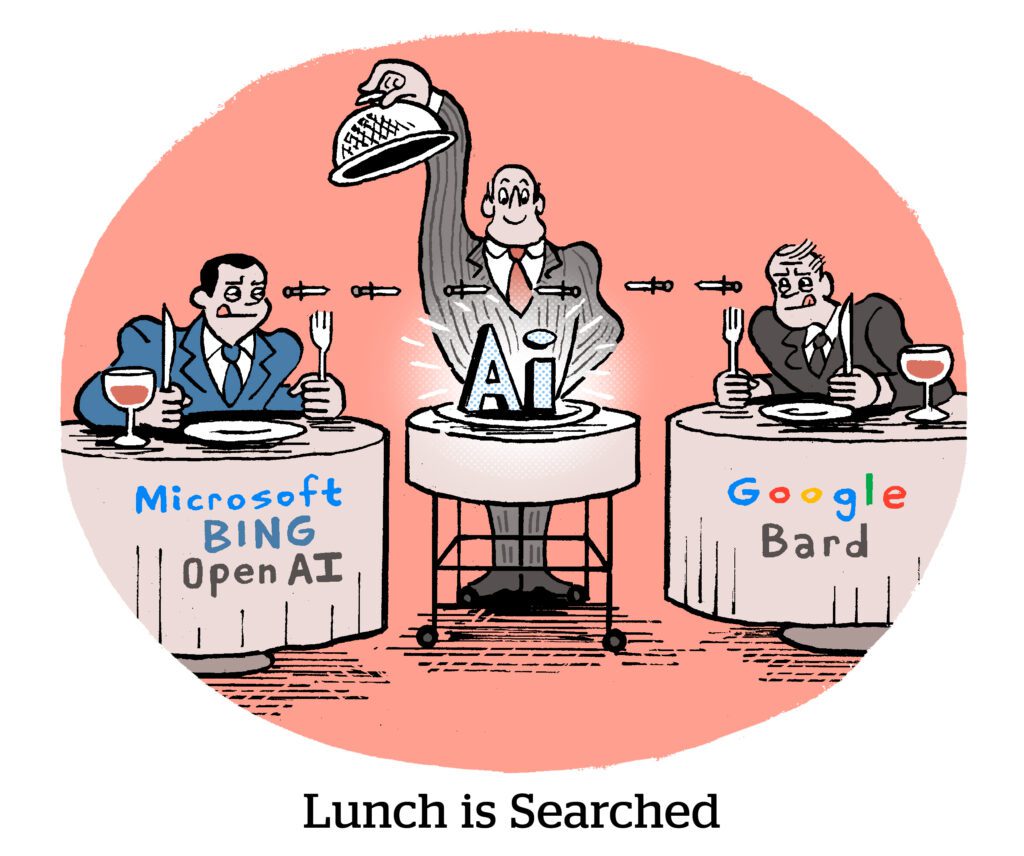Here’s today’s AdExchanger.com news round-up… Want it by email? Sign up here.
We don’t like to boast, but we did a thing: AdExchanger just won regional gold, silver and bronze awards for our editorial coverage at the 2023 Azbee Awards. Check it out, and sincere thanks to our readers!
Still Searching
Googlers were in “panic” mode last month after Samsung execs said they were considering moving to Microsoft Bing as its default search engine, The New York Times reports.
Take that with a fistful of salt, however, as Samsung seems to have simply been putting Google through its paces.
The news comes amid the launch of Bing’s glitzy AI tech following Microsoft’s OpenAI investment. But ChatGPT isn’t ready for primetime.
If Bing had won the Samsung contract – which Google pays $3 billion per year for – it wouldn’t be for ChatGPT-type search, though. It would be normal ol’ Bing vs. standard Google search.
Which means that if Samsung is “considering replacing” Google with Bing, it’s actually considering a competitive bid by Microsoft.
Samsung would be a coup for Microsoft Advertising. Not Netflix-level, mind, but it would sting the loser. Samsung has used Google search for well over a decade.
Although outbidding Google for the Samsung deal could cost Microsoft a pretty penny: $10 billion or more for the first two or three years.
The bigger whale is Apple, which licenses search traffic to Google for a cool $20 billion per year.
Don’t Hate, Affiliate
Google and YouTube haven’t had a sharp commerce strategy, aside from just really wanting to be a commerce player. Google has taken a “throw everything at the wall and see what sticks” type of approach … and not everything did.
Take the product tagging feature, which has been in testing with creators for the past year and is now being phased out, Insider reports.
But in keeping with the “see what sticks” mindset, YouTube is still trying its luck. Now it’s shifting more focus to its affiliate program.
The product tagging program, which let creators link to purchase items mentioned or displayed in a video, paid creators a flat monthly fee, not an affiliate commission per sale. YouTube sweetened the deal by offering distribution benefits, like more reach and engagement.
But those are “short-term incentive programs,” according to a YouTube Support post.
“We strongly believe that YouTube is the best place for creators to build a business and that an affiliate model will be the most beneficial way for creators to earn money at scale,” according to the post.
Is Instagram #Winning?
Step aside, TikTok.
Insta is still where most marketers (well, 51%) plan to increase their marketing spend, according to the HubSpot/Brandwatch Global Social Media Trends Report that’s made up of two surveys, one of social media marketers and another of US consumers.
Instagram was ahead on many metrics, Adweek reports. Marketers say the Meta-owned platform produces the best ROI, engagement and quality leads of any social network. Instagram also boasts the most accurate algorithm and greatest growth prospects.
On top of that, Insta is apparently great for developing an engaged online brand community, which 9 out of 10 marketers deem “absolutely essential” to their social strategy.
In a slowing economy, social media marketers must comb their budgets and keep an eye on ROI.
“We see Instagram as a platform that offers better linkage to driving sales conversion opportunities,” says Sebastian Micozzi, SVP of digital transformation at spirits brand Bacardi.
But Wait, There’s More!
Kya Sainsbury-Carter, who recently was named to head Microsoft’s ad business, offers an inside look at the game plan. [WSJ]
Meta tries to lure advertisers with Reels discounts and AI tools. [The Information]
At WWDC in June, Apple will unveil app sideloading for iOS 17 so that apps can be downloaded outside of the App Store. [Bloomberg]
AMC Networks will launch an ad-supported streaming service and name it AMC+ (of course). [Ad Age]
How extended highlight reels (i.e., game recaps) are changing sports fandom and monetization. [The Verge]
You’re Hired!
Ad tech vet Alex Cone joins Google’s Privacy Sandbox team. [tweet]


















